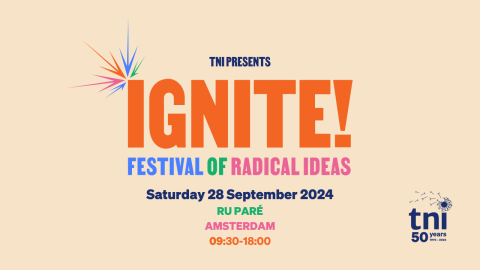IGNITE! Festival of Radical Ideas Activist Conference (Day 2)
Day two of the Ignite! Festival will include a series of insightful plenaries and interactive workshops at Ru Pare, featuring TNI staff, fellowship participants, and dedicated Dutch activists. This day focuses on tackling some of the most pressing challenges of our time while showcasing the vital work of TNI and its social movement allies.

Programme
10:00: Opening Plenary
With Fiona Dove, Thea Riofrancos, Hamza Hamouchene and Josephine Valeske
11:00: Workshops round 1
12:30: Lunch
Provided by De Sering
1:45: Book launch: Dismantling Green Colonialism
Hamza Hamouchene and Katie Sandwell
2:30: Workshops round 2
4:00: Coffee/Tea break
4:15: Closing plenary
With Sara Murawski, Hilary Wainwright, Harriet Bergman and Kali Akuno
5:00: Borrel
Music by Q.A.Q, (Adam Al Qaq) with Pala.G
6:00: Close
Workshops round 1
1. Migration: from Walls to Bridges
How are private companies benefitting from anti-migration politics and sometimes even driving them? What consequences do ‘smart’ borders and biometric surveillance have for people on the ground? How can we resist the tide of hatred against people on the move at city level and change the narrative towards welcoming people on the move?
2. From militarism to collective safety: Stopping the endless rush to war
How do we stop the relentless rush to war? What are our answers/vision of collective security? How militarism attempts to forge a European nationalism vs Russia/China, the other (migrants, Muslims etc). What are other underlying agendas eg. competition over resources, who leads the next phase of capitalism ie green/digital technologies?
3. From farmers’ protests to emancipatory rural futures
Is climate action and farming incompatible with each other? How do we address climate action and strengthen family farming? How do we undermine or replace industrial agriculture and build an alternative that is sustainable and accessible to all?
4. Post-growth and decolonization: Towards an equitable and sustainable planet
The industrialized world has surpassed most ecological planetary boundaries, while the race for critical raw materials is pacing up. Which old and new forms of economic subordination, exploitation and colonization are we witnessing today? How can post-growth contribute to decolonize these structures while providing for sustainable and equitable development across the globe?
Workshops round 2
5. Energy transitions: from big oil to decolonial and democratic public power
Can green capitalism save the world or do we need public power pathways? And how do we build an energy system that doesn’t replicate patterns of colonial extractivism? Together with excellent contributors, we will dive into the geopolitics of the global energy economy, just transition organising learnings and anti-extractive industrial policy. The goal: sharpening strategies to achieve public energy transitions that are decolonial and democratic.
6. Solidarity in struggle: Lessons in cross-movement solidarity with Palestine from the experience in the Netherlands
Following nearly one year since Israel’s genocide in Gaza, it has become clear that longer-term strategies are needed to sustain movements and coordinate activities to continue to apply pressure on governments and institutions to end complicity and relations with Israel and Israeli institutions. In this workshop, we aim to bring together movements pushing for a free Palestine to provide the space to reflect on key successes and challenges in cross-movement solidarity based on the experience in the Netherlands.
7. Understanding fascism and the rise of the far-right
Why is the right on the rise everywhere? What are the underlying causes and the reasons for their success? How has the far-right succeeded at building its presence online? What can we do to confront the right and offer a visionary progressive alternative?
8. From neoliberalism to a New International Economic Order
In this time of global fractures, what are the opportunities and challenges for building a more just international economic order? What power is shifting globally and what isn’t? Which economic and financial reforms are needed to foster a just transition for all countries? Which proposals from the South are emerging?
Lunch will be served by De Sering and is plant-based.